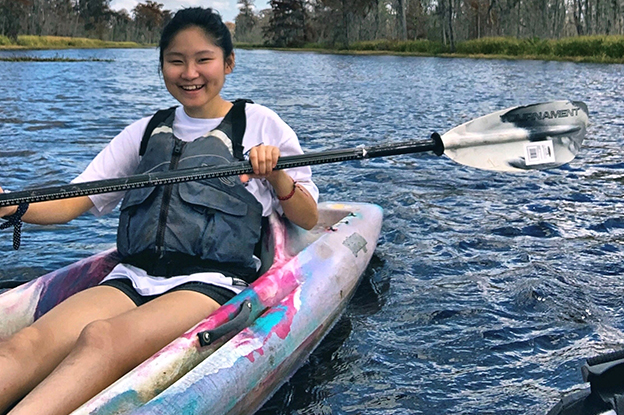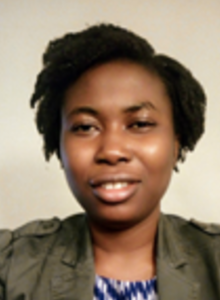In the Spring of 2020, the COVID-19 pandemic disrupted the lives of college students around the world with classes moving online, internships rescinded, and graduation ceremonies cancelled. These developments have affected the career plans and aspirations of a generation of college students. CCWT launched this oral history project to document and amplify student voices and experiences during the pandemic.

Xiaokun Niu, who also goes by the name Mia, majors in Economics with a certificate in Environmental Studies at UW-Madison. She is an international student from China. Her choice of program was inspired and encouraged by her parents, who both work in the banking sector. To Mia, “Economics is important because, no matter where you work, either in the bank or the financial services, it’s so important to your life.” In her interview, she notes the ways that the pandemic robbed her and her classmates of social and intellectual experiences, yet points to the positive impact of the pandemic on the environment. The interview ends with her take on the recent protests and her experience with racism on campus. This interview with Mia was conducted by Esther Ama Safia Mohammad. The transcript was edited and condensed by Alexandra Pasqualone.
When you first learned about the COVID-19 pandemic affecting courses and programs at UW-Madison, what was your reaction?
It was Spring Break, and we could not go anywhere. Classes switched to online. I just feel like it robbed a big part of my college experience, including socializing, attending physical classes, and meeting new people. I cannot attend physical classes and cannot really see the professor and classmates. I feel like that has damaged my study habits because I’m not as motivated. It is a bummer. I don’t like it at all.
I just feel like it robbed a big part of my college experience, including socializing, attending physical classes, and meeting new people.
Are you employed during the school year?
I am not employed, but I applied to a position this summer. They have not given me their response yet because things were not that stable.
Are any of these changes especially challenging or difficult to manage?
Not for me, but for a lot of people around me. My friends wanted to go back home and it has actually impacted their lives. One of my friends applied to her home country’s university, but she could not get back home because of the situation and now it has been hard for her.
What are your future career plans? How has COVID-19 affected those plans going forward?
I have not really planned my future career. I am just hoping I can get a job after I graduate here. Maybe I will go to graduate school. I do not really know. So many people are unemployed. I just feel like it is much harder for international students to get employed in America. And, you know, President Trump enacted some policies which are not friendly to Chinese international students. There is definitely going to be some impact. I may not continue my studies in America anymore after I graduate.
In recent weeks, we’ve seen mass protests and outrage over the killing of George Floyd in Minneapolis. Have these events influenced or otherwise affected you in any way?
Yes. I will say it has definitely influenced my life in a positive way. It is about justice. Everybody is equal, regardless of race or which country you come from. The peaceful protest has really changed my mind. It taught me how warm people are. I just feel like we are living in a really meaningful historical moment right now. I totally support what the people are doing.
I just feel like we are living in a really meaningful historical moment right now. I totally support what the people are doing.
Have you personally encountered racism during your time as a college student? If so, and if you are comfortable doing so, can you describe the situation?
I do not really feel racism here, even though when the pandemic or coronavirus started someone wrote something like “China virus” on State Street. I did not get really mad because it is not like an extreme case, since not everybody thinks that way. In my life, I feel like I faced racism once. There was a man riding a bike past me on State Street and he shouted, “Look at that sexy ass Asian girl!” I felt a little bit offended.
Do you have any final thoughts?
I just feel like the pandemi, is not just a disaster. Definitely, there are so many people dead. It is, however, also an opportunity for people to think like, “What do I want to do?” Remote work might be the future mode for working. COVID-19 has also improved the environmental situation. Like water is becoming cleaner.
COVID-19 has also improved the environmental situation, like water is becoming cleaner.
Staff
 Esther Ama Safia Mohammed is a Fall 2020 graduate of the Professional French Master’s Program at UW-Madison. She also holds a master’s degree in Linguistics and Didactics from the University of Cape Coast, Ghana. Her academic research on student motivation and international mobility informs her understanding of Human resource development. Ama has gained diverse professional experiences from working as a teaching assistant in Cape Coast, as an executive assistant at a logistics company in Burkina Faso, as an assistant manager of a cocoa cooperative in Cote d’Ivoire and as a project assistant in a philanthropic organization in Quebec. In summer 2020, Ama worked at CCWT with a team of student-workers to collect oral histories to document student-experiences during the coronavirus pandemic. Through this work, she gained insight into student anxieties concerning their future careers in the fast-approaching post-Covid world.
Esther Ama Safia Mohammed is a Fall 2020 graduate of the Professional French Master’s Program at UW-Madison. She also holds a master’s degree in Linguistics and Didactics from the University of Cape Coast, Ghana. Her academic research on student motivation and international mobility informs her understanding of Human resource development. Ama has gained diverse professional experiences from working as a teaching assistant in Cape Coast, as an executive assistant at a logistics company in Burkina Faso, as an assistant manager of a cocoa cooperative in Cote d’Ivoire and as a project assistant in a philanthropic organization in Quebec. In summer 2020, Ama worked at CCWT with a team of student-workers to collect oral histories to document student-experiences during the coronavirus pandemic. Through this work, she gained insight into student anxieties concerning their future careers in the fast-approaching post-Covid world.
 Alexandra Pasqualone is a second-year student in a Joint PhD in Educational Policy Studies (EPS) and History. She has spent several years teaching in various capacities, including positions as a high school teacher in NJ, an English teacher at Akdeniz University in Turkey, and a Career Access and College Readiness Coordinator in Philadelphia. She is broadly interested in the historical role of youths as major activists who spurred changes within their communities. As part of her MA thesis at the University of Cincinnati, Alexandra conducted an oral history project attending to the protests of high school students in Philadelphia during the late 1960s and 1970s. Her current research centers around the implications of schools on Arab-American identity formation during the mid-twentieth century.
Alexandra Pasqualone is a second-year student in a Joint PhD in Educational Policy Studies (EPS) and History. She has spent several years teaching in various capacities, including positions as a high school teacher in NJ, an English teacher at Akdeniz University in Turkey, and a Career Access and College Readiness Coordinator in Philadelphia. She is broadly interested in the historical role of youths as major activists who spurred changes within their communities. As part of her MA thesis at the University of Cincinnati, Alexandra conducted an oral history project attending to the protests of high school students in Philadelphia during the late 1960s and 1970s. Her current research centers around the implications of schools on Arab-American identity formation during the mid-twentieth century.
